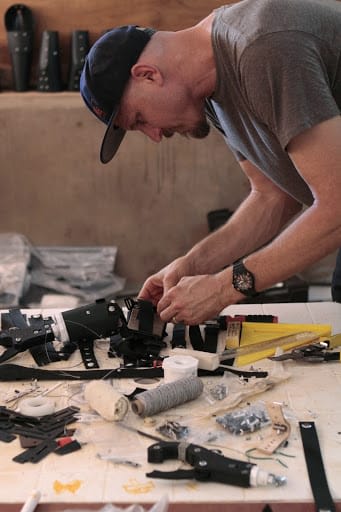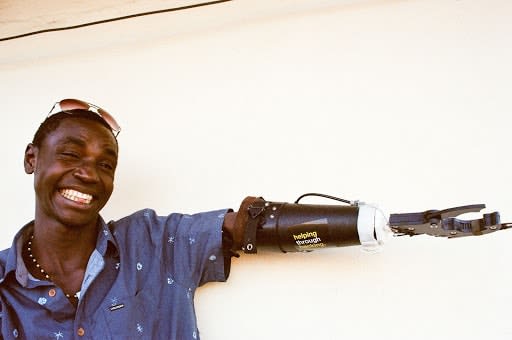The Temporary State of Impossible, with
Mick Ebeling
In my work with companies, corporations and governments around the world, one of the themes I frequently encounter during these interactions is that something can’t be done because “it’s impossible.” This mindset discourages innovation, stalls organizational progress and limits business success—and once entrenched, is extremely difficult to overcome. It’s a mentality that’s pervasive in the identity space, where it’s impossible to know for sure that every person we interact with in the digital world is who they say they are; at least that is what we’ve led ourselves to believe.
But during the many years of my career, I’ve also been fortunate enough to interact with some incredible people for whom “impossible” is merely a welcome challenge. Mick Ebeling of the tech incubator Not Impossible Labs is one such individual. Mick’s organization’s mission is to make the impossible not impossible, believing that with engineering, technology, willpower and the right people, together we can overcome any obstacle.
In this week’s Hello User podcast, “Saying No to the Impossible and Yes to a Better World,” Mick and I sit down to chat about the amazing things that can be done, both within and outside of technology, in fixing societal issues that we face daily. Here of some of the highlights of that conversation.

Takeaway #1: Technology is important for the sake of humanity.
“Our metric is: Does it do good for the world? How does it address absurdities?”
Typically incubators support new and innovative businesses that have unicorn potential. But Not Impossible Labs is a different type of incubator, one that focuses on whether their investments address what they call absurdities: the things you see in the world that cause you to say “something just isn’t right.”
Their mission is to use technology for the sake of humanity, measuring success not by how profitable the supported company is, but instead by how people can be helped. Not Impossible Labs follows the model of “help one, help many,” whereby they solve an issue for one person who is a representative of a systemic problem, and then work to expand to solve that problem for a larger community.
Good storytelling is what makes it possible. I like to say that anyone can create a PowerPoint, but not everyone can tell a story. Not Impossible Labs’s use of storytelling is how they scale up and get what they’ve created out to the masses. Take Project Daniel, for instance. Mick and his team went to a refugee camp in Sudan and created arms for a young boy named Daniel in the world's first 3D printing prosthetic lab, enabling the boy to feed himself for the first time in the two years following a horrific bombing accident. Sharing that experience with the business community allowed them to better recruit, retain, brand and perform other activities so they could continue to go out and do good while inspiring some interesting partnerships.

This all resonates with Ping because our mission as a company is to help people be secure in the digital world. The idea that people are worth protecting and keeping safe online—and that technology can help make it happen—is a major driver for us.
Takeaway #2: Impossible is a temporary state.
“Commit, then figure it out.”
In the past 12 months, I’ve spoken roughly 170 times to audiences ranging from a handful of people to thousands. In the course of dealing with intractable issues within technology as well as within society, I realized that the problem-solving community is not as large as we would hope it would be. Solving problems and fixing injustices requires passion. It takes a certain amount of focus, discipline and enthusiasm.
But we all have within us the ability to make change. You don’t have to know how to do it all, you just have to have passionate conviction and resolve. Not Impossible Labs’s mantra is to commit and then figure out how to make what at first seems insurmountable attainable. You don’t have to figure it out all by yourself; championing and being an advocate and catalyst is half the battle. With the right application time, effort and unique thinking, it's simply a matter of deciding when what at first was impossible becomes possible.
Takeaway #3: We are not our digital selves.
“Some information, many times, can be way more dangerous than all of the information.”
The mindset of believing it’s vital to make a difference permeates my work here at Ping, and so naturally my conversation with Mick turned to observations on identity in the technology space and how it can be a positive for humankind when done correctly.
Unfortunately, we as individuals haven't been in the seat to define our own identities. Over the past decade, so many other entities have been crafting our digital identities, like the algorithms that have decided a Venice Beach-living, skate-boarding, surfing male like Mick shouldn’t be served up content on crocheting, or the social media companies run by a small demographic that control the narrative for billions of people around the world.
This has led to a large crevasse in reality and portrayal. The digital self doesn’t represent the rich reality of a human being; it only represents a certain aspect or a facet. That small subsection of information can be dangerous because it is often the basis for assumptions, which can lead to division in society. It’s important to account for the nuances of diversity and inclusion and equity in the digital world, just as we need to in an analog and physical world.
Takeaway #4: Change is happening.
“We are beginning to see people resist losing their digital identity and privacy.”
Our society still has to combat the fact that many people are really excited to give away their information for a 30% discount on a pair of shoes, but I see attitudes and expectations changing. People are tired of companies losing their data, of their personal information being shared unwillingly, and of the divisions created by digital constructs. One of our surveys found that 39% of consumers ranked data privacy as their number one technology concern for the next year.
The good news is that bringing certain pieces of our digital selves back under our control is happening right now. Individuals expect companies to keep their data safe and use it appropriately, and they expect to be able to easily and securely prove who they are with devices or locations. Companies are responding to those expectations by investing in identity security and improving privacy controls.
And that’s where I’d like to leave this, on a hopeful note, with the observation that we’re getting more comfortable with the evolution of technology. We’re in a space where we’re becoming more mature about our expectations and our desires to see what we can accomplish with technology, rather than experimenting with technology for technology's sake.
I want to thank you for taking the time to think about how to make the world a better place. To listen to the deeper discussion and explore our other episodes, please head to the Hello User podcast page.
